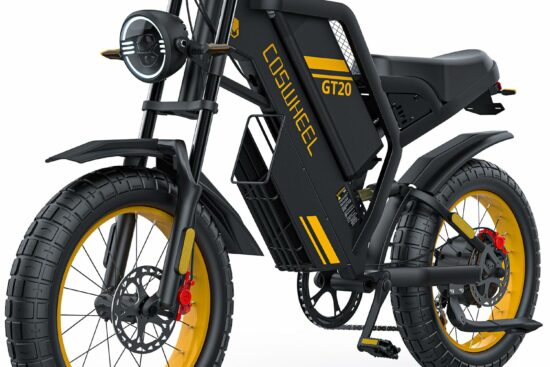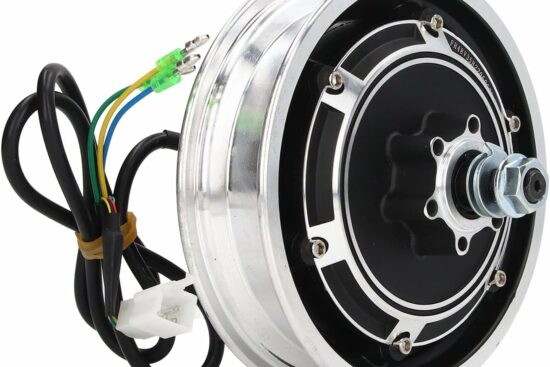
Are you curious about the positive impact that e-bikes can have on the environment? Well, you’re in luck! In this article, we’ll explore the various ways in which e-bikes can benefit our planet. From reducing carbon emissions to preserving natural resources, e-bikes have the potential to be a game-changer in terms of sustainable transportation. So, if you’re looking for an eco-friendly alternative to traditional bikes, stay tuned because we’ve got all the details right here!
If you’re interested in learning more about the environmental benefits of e-bikes, you’re in for a treat! In the following paragraphs, we’ll delve deeper into the topic and discuss how e-bikes can help tackle air pollution, decrease fossil fuel consumption, and promote a healthier and greener future. Whether you’re passionate about protecting the environment or simply looking for ways to reduce your carbon footprint, e-bikes have a lot to offer. So, get ready to discover why e-bikes are not only a fun and efficient mode of transportation but also a sustainable choice for a cleaner planet. E-bikes, or electric bicycles, have been gaining popularity as a sustainable and eco-friendly mode of transportation. With their numerous advantages over traditional cars, e-bikes offer a greener and more sustainable alternative that can significantly contribute to reducing carbon emissions and improving overall environmental conditions. In this article, we will explore the various environmental benefits of e-bikes and how they can positively impact our planet.
Reduced Carbon Emissions
One of the most significant environmental benefits of e-bikes is the reduction in carbon emissions. E-bikes do not have tailpipe emissions since they are powered by an electric motor and a rechargeable battery. Unlike cars, which emit harmful gases into the atmosphere, e-bikes produce zero emissions during operation. This makes them an excellent choice for those concerned about air pollution and global warming.
In addition to the absence of tailpipe emissions, e-bikes also have lower greenhouse gas emissions compared to cars. The electricity used to charge the e-bike’s battery can be obtained from renewable sources, further reducing their carbon footprint. By choosing to ride an e-bike instead of driving a car, you are actively helping to combat climate change and reduce your personal contribution to greenhouse gas emissions.
Improved Air Quality
Along with reducing carbon emissions, e-bikes also contribute to improved air quality. Traditional combustion engine vehicles release harmful exhaust fumes, including pollutants such as nitrogen oxides (NOx), volatile organic compounds (VOCs), and particulate matter (PM). These pollutants have detrimental effects on human health and the environment.
By switching to e-bikes, you eliminate the emission of these harmful exhaust fumes. With no tailpipe emissions, e-bikes help decrease levels of NOx, VOCs, and PM in the air, resulting in cleaner and healthier environments. This is particularly important in congested urban areas where air pollution from cars can reach hazardous levels.
Reduced Noise Pollution
Another significant environmental benefit of e-bikes is the reduction in noise pollution. Unlike cars and motorcycles, e-bikes operate quietly, contributing to quieter streets and neighborhoods. This not only creates a more peaceful and pleasant environment for residents but also benefits wildlife and nature.
The noise reduction provided by e-bikes is especially valuable in urban areas where traffic noise can be a significant source of stress and negative health effects. E-bikes offer a quieter alternative, making commuting more enjoyable and improving the overall quality of life for individuals living in densely populated areas.
Conservation of Energy Resources
E-bikes are a more energy-efficient mode of transportation compared to cars. Electric motors used in e-bikes have high conversion efficiency, meaning they can convert a larger portion of the energy from the battery into mechanical energy to propel the bike forward. In contrast, internal combustion engines in cars are less efficient and waste a significant amount of energy as heat.
Furthermore, e-bikes consume less energy compared to cars. Depending on battery capacity and rider input, an e-bike can travel between 20 and 50 miles on a single charge. This is much more energy-efficient than a car, which typically travels at a rate of only a few miles per gallon of fuel.
By conserving energy resources, e-bikes help reduce overall energy consumption and dependence on fossil fuels. This is crucial in mitigating the depletion of finite resources and promoting a more sustainable future.
Reduced Traffic Congestion
E-bikes offer a solution to the problem of traffic congestion in urban areas. With the growth of cities and increasing car ownership, traffic congestion has become a significant issue, resulting in longer travel times, increased pollution, and decreased convenience for commuters.
By promoting the use of e-bikes instead of cars, we can reduce the number of vehicles on the road and alleviate traffic congestion. E-bikes can access bike lanes, cycle paths, and other dedicated cycling infrastructure, allowing for faster travel times and more efficient movement in congested urban areas. This not only benefits e-bike riders but also contributes to smoother traffic flow for all road users.
Promotion of Sustainable Transportation
E-bikes play a crucial role in promoting sustainable transportation. They offer an alternative to cars for short commutes and can encourage a cycling culture within communities. With their electric motor assistance, e-bikes make cycling more accessible and appealing to a wider range of individuals, including those who may not have considered cycling as a feasible option before.
By choosing to ride an e-bike, you contribute to reducing reliance on cars and embrace a more sustainable transportation option. E-bikes offer a convenient and eco-friendly mode of travel for short distances, such as going to work, school, or running errands. This can have a significant impact on reducing traffic congestion, improving air quality, and creating a more sustainable and livable environment.
Improved Physical and Mental Health
Using e-bikes for transportation also comes with several health benefits. Regular physical activity, such as cycling, has been shown to improve fitness levels and overall health. E-bikes provide an opportunity for individuals of varying fitness levels and abilities to engage in physical activity without feeling overly exerted.
Furthermore, riding an e-bike can help reduce stress levels. Commuting by car can be a stressful experience due to traffic jams, road rage, and the overall hassle of navigating through congested areas. In contrast, riding an e-bike allows you to enjoy the scenery, feel the fresh air, and experience a more peaceful and enjoyable commute. This can have a positive impact on mental well-being and contribute to a healthier lifestyle.
Cost Savings
In addition to the environmental and health benefits, e-bikes can also help you save money. Compared to cars, e-bikes have significantly lower fuel expenses. The cost of recharging the e-bike’s battery is much cheaper than the price of gasoline or diesel fuel required for cars.
Moreover, e-bikes require less maintenance compared to cars. With fewer moving parts and a simpler mechanical system, e-bikes generally have lower maintenance costs and can be more affordable to own and operate in the long run.
Reduced Land Use
Finally, e-bikes contribute to reduced land use. With limited space in urban areas, parking infrastructure takes up a significant amount of land. Cars require ample parking spaces, which can lead to the destruction of natural habitats, increased impermeable surfaces, and limited green space.
E-bikes, on the other hand, require much less space for parking. Their compact size allows for easier storage, and they can be parked in designated bike racks or even indoors if available. By choosing e-bikes over cars, we can reduce the demand for parking spaces, alleviate pressure on land use, and preserve natural environments.
Conclusion
E-bikes offer numerous environmental benefits that contribute to reducing carbon emissions, improving air quality, and conserving energy resources. Additionally, e-bikes help reduce noise pollution, alleviate traffic congestion, promote sustainable transportation, enhance physical and mental health, and offer cost savings.
By embracing e-bikes as a sustainable mode of transportation, we can work towards creating greener and more livable cities. Whether it’s for commuting, running errands, or simply enjoying a leisurely ride, e-bikes have the potential to revolutionize our transportation systems and bring about positive changes for both the environment and individuals. So hop on an e-bike and start reaping the environmental benefits while enjoying a convenient and enjoyable ride.




















